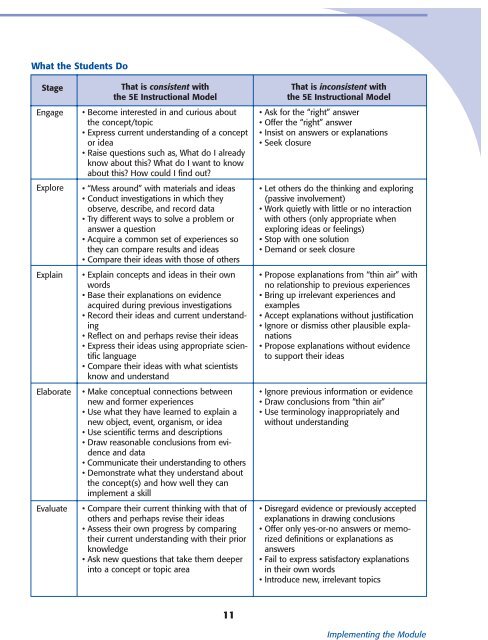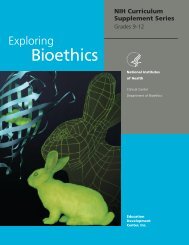Biological - NIH Office of Science Education - National Institutes of ...
Biological - NIH Office of Science Education - National Institutes of ...
Biological - NIH Office of Science Education - National Institutes of ...
Create successful ePaper yourself
Turn your PDF publications into a flip-book with our unique Google optimized e-Paper software.
What the Students Do<br />
Stage<br />
Engage<br />
Explore<br />
Explain<br />
Elaborate<br />
Evaluate<br />
That is consistent with<br />
the 5E Instructional Model<br />
• Become interested in and curious about<br />
the concept/topic<br />
• Express current understanding <strong>of</strong> a concept<br />
or idea<br />
• Raise questions such as, What do I already<br />
know about this? What do I want to know<br />
about this? How could I find out?<br />
• “Mess around” with materials and ideas<br />
• Conduct investigations in which they<br />
observe, describe, and record data<br />
• Try different ways to solve a problem or<br />
answer a question<br />
• Acquire a common set <strong>of</strong> experiences so<br />
they can compare results and ideas<br />
• Compare their ideas with those <strong>of</strong> others<br />
• Explain concepts and ideas in their own<br />
words<br />
• Base their explanations on evidence<br />
acquired during previous investigations<br />
• Record their ideas and current understanding<br />
• Reflect on and perhaps revise their ideas<br />
• Express their ideas using appropriate scientific<br />
language<br />
• Compare their ideas with what scientists<br />
know and understand<br />
• Make conceptual connections between<br />
new and former experiences<br />
• Use what they have learned to explain a<br />
new object, event, organism, or idea<br />
• Use scientific terms and descriptions<br />
• Draw reasonable conclusions from evidence<br />
and data<br />
• Communicate their understanding to others<br />
• Demonstrate what they understand about<br />
the concept(s) and how well they can<br />
implement a skill<br />
• Compare their current thinking with that <strong>of</strong><br />
others and perhaps revise their ideas<br />
• Assess their own progress by comparing<br />
their current understanding with their prior<br />
knowledge<br />
• Ask new questions that take them deeper<br />
into a concept or topic area<br />
That is inconsistent with<br />
the 5E Instructional Model<br />
• Ask for the “right” answer<br />
• Offer the “right” answer<br />
• Insist on answers or explanations<br />
• Seek closure<br />
• Let others do the thinking and exploring<br />
(passive involvement)<br />
• Work quietly with little or no interaction<br />
with others (only appropriate when<br />
exploring ideas or feelings)<br />
• Stop with one solution<br />
• Demand or seek closure<br />
• Propose explanations from “thin air” with<br />
no relationship to previous experiences<br />
• Bring up irrelevant experiences and<br />
examples<br />
• Accept explanations without justification<br />
• Ignore or dismiss other plausible explanations<br />
• Propose explanations without evidence<br />
to support their ideas<br />
• Ignore previous information or evidence<br />
• Draw conclusions from “thin air”<br />
• Use terminology inappropriately and<br />
without understanding<br />
• Disregard evidence or previously accepted<br />
explanations in drawing conclusions<br />
• Offer only yes-or-no answers or memorized<br />
definitions or explanations as<br />
answers<br />
• Fail to express satisfactory explanations<br />
in their own words<br />
• Introduce new, irrelevant topics<br />
11<br />
Implementing the Module

















